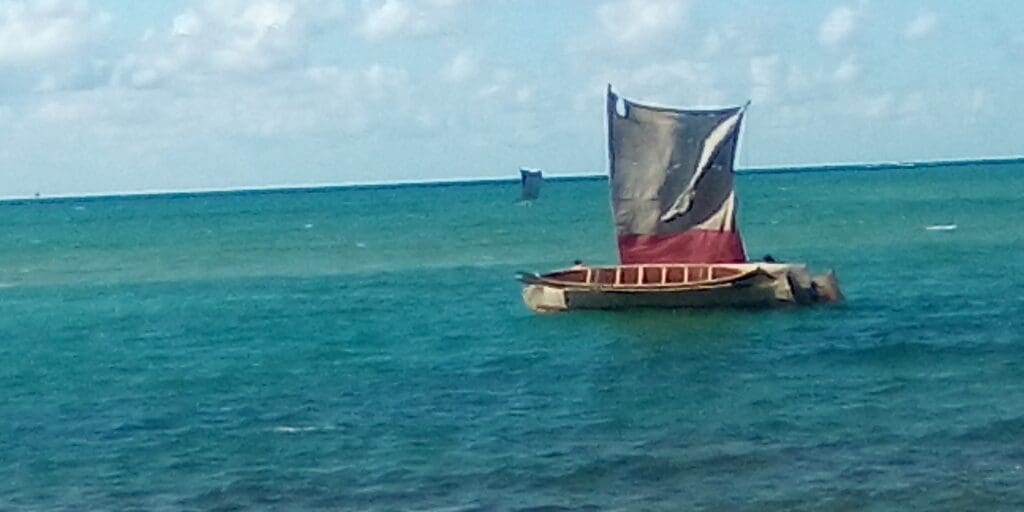Belo Sur Me
We traveled to Belo Sur Mer by boat from Morondava. About a 1.5 hour ride in relatively calm waters. We’re staying at Ecolodge, owned by a French couple. Nice thatch bungalos at the entrance to the cove. The husband was a realtor and the wife a social worker from what I could understand. They had visited Madagascar once or twice, found this place online for sale, and jumped in. The bungalos are nice. Beds with mosquito nets, shower and sink and toilet and running water. They run on solar power. There are lights in the rooms, but no outlets. If you need to charge something, you take it to the bar, where there are power strips for this purpose. The couple are wonderful hosts. There’s a restaurant in the middle of the compound. The food is very good. Seafood from the nearby sea. Fish and crab. It would be a perfect place if it weren’t for the mosquitoes that come out at night. One little crack in the mosquito net fortress and one gets in and invites all their friends.
If you’re up at 5 am, you’ve already missed a lot. Dozens of boats are already in the distance fishing from their canoes with their sails up. The entrance to the cove is right in front of my bungalo, and about 50 yards wide at low tide; I have a front row seat as the fishermen paddle by. . I saw a group of people coming along the beach. When I heard the singing, then a cross, I figured it was church. When I saw the little casket carried on men’s shoulders, I understood it was a funeral procession. I sat on my porch unnoticed. The women sang a song in Malagasy. Maybe the most beautiful singing I’ve ever heard. The women wore bright formal lapas around their waists like the one presented to me in Betania.
When the group got around the corner, they were now on the beach outside of the cove. I then saw a large canoe and several smaller ones emerge from around the bend. Perhaps they are taking the deceased to a distant island where there is a graveyard. Not long after, many of the procession returned down the path to town. Almost all women. Smiling and in lively conversation. Mostly they past by age. The younger, faster walking women first, and the grannies bringing up the rear. Maybe it is the men’s work to take care of the ceremony in the canoes from here. A person wants to ask the passersby about the ceremony and what just happened, but some questions are more appropriately left unasked.. And glad I did not. I found out from the others later a young boy with some sort of limb deformity drowned yesterday while washing his clothes in the cove. The size of the casket fits the story. So sad. With no way to preserve the body, the casket must have been made yesterday and today the burial.
As I watch the fishermen leave for the sea, I think about their lives, sitting below the sea surface in their canoes, and living much of their lives with 20 inches of free board. Their craft are perfect. The canoe with a single outrigger, almost always on the starbard side of the canoe. The outrigger stabilizes the canoe, with the weight of the outrigger bending the canoe towards it, and the flotation of the outrigger pushing back against the canoe. Physics in action. I’ve only been out in the craft once in any sort of a chop – just 1 to 2 foot seas – but the craft didn’t wobble or tip in the least. A 20 hp outboard pushed our craft loaded with 5 of us with ease. The fishermen use sails.
They certainly live every day, with no two days at sea the same. They see changes to their environment that man’s invented instruments can measure, but only in numbers. Climate change and foreign trawlers vacuuming up their fish before they get nearshore where they can catch it is their reality. They receive all the impacts of the outside forces, but receive little of the benefits the industrialized society created. Perhaps a little improved health care and a cell phone. But no power grid. No mass transit system. Not even a dock for their village. Retirement isn’t a concept. Never did it make sense to save money, if you had any to save, because the inflation on this paper you exchange for goods is so high that what a dollar will buy this year, it will take a dollar fifty to buy it next year. You work til you can’t work anymore. Then maybe someone will take care of you. You hope your good deeds in your lifetime now provide some level of care from your family. But of course, they have to work, too. Elders with skin that still shines – the men still with well defined biceps and grannies who can squat to sit with their heels against their bottoms – still limber as a teenager from a lifetime of physical work outside. “Development” agencies are now offering them programs like aquaculture and mariculture and tourism to give them livelihoods which they can’t make from the sea anymore. My guess is the fishermen would rather have the pittance back from the sea that they used to take with their primitive craft and simple fishing methods, rather than have their fish caught offshore by foreigners and now have to find a new job. Like climate change, it seems no one in the world has the strength to stop trawling as a fishing method. Anywhere in the world. Even when we see the evidence of its impacts.
More fishermen continue to leave the cove in their boats, chit chatting to each other as they paddle. Maybe these two grew up together. Perhaps both will have their own boat someday, and fish side by side for a lifetime.
It’s been great to have another Peace Corps volunteer on this assignment. 30 years my junior, but we both get the inequities of the world having had the mutual Western privilege of our government sending us to live in rural Africa for two years. All expenses paid.
Several of the others went out on a boat to an island today to snorkel and have a picnic. I couldn’t bear the notion of more sunburning on my pasty white vitamin-D deprived body from all the years in Alaska under long sleeve shirt and pants. I’m already burned trying to keep covered, and with so many more little workshops still ahead of me, I thought it best to sit tight in the shade. I don’t feel like I’m missing out. There’s so much to see here in a day. A canoe with what I assume is a husband and wife, laden with heavy bags of perhaps trade goods like salt or rice or beans, either just bought or taking in to sell. People on the distant beach across the cove digging up sand and putting it in a mosquito net and sifting through it, looking for what I do not know.

